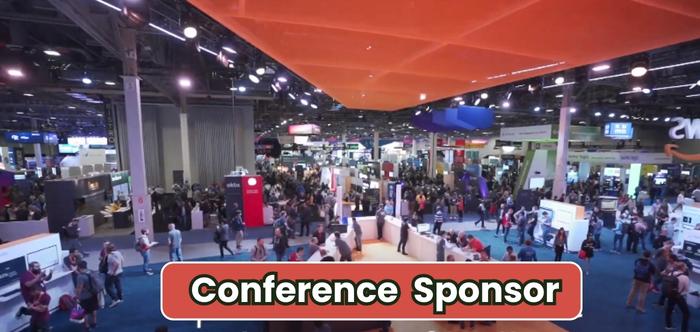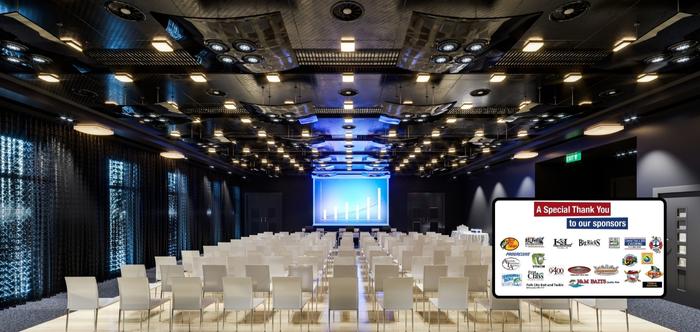Companies are constantly seeking innovative ways to elevate their brand and forge meaningful connections. Sponsoring a conference emerges as a powerful strategy to achieve these objectives. This approach is not just about getting your logo out there; it’s about creating impactful, lasting impressions within your industry.
Interestingly, the benefits of sponsoring a conference go beyond mere brand exposure. It opens doors to targeted marketing opportunities, and direct engagement with potential clients or partners, and notably, positions your brand as a thought leader.
In this blog, we’ll delve into how sponsoring a conference can transform your business’s outreach, enhance networking, and solidify your standing in the industry. Join us as we explore the multifaceted advantages of this strategic move.
A Brief Summary of Sponsors of a Conference
Conference sponsors typically represent a diverse array of industries, each bringing unique expertise and value to the event. Their involvement ranges from financial backing to providing essential services or products. This symbiosis benefits both the event and the sponsors, enhancing the overall experience.

In addition to keynote speeches and booths, well-known conference planners enlist sponsors to gain exposure to a targeted industry audience. Such direct engagement promotes long-lasting business relationships and potential collaborations.
Who Can Be a Conference Sponsor?
Conference sponsorship is a dynamic opportunity, attracting a wide spectrum of participants eager to enhance their brand’s visibility and networks. From emerging startups to established corporations, the range of potential sponsors is vast. This variety improves the conference experience, offering diverse perspectives and solutions.
Large Corporations
Major companies often sponsor conferences to reinforce their status as industry leaders. They leverage these events to showcase innovations and strengthen brand loyalty. Their presence can significantly elevate the conference’s prestige and attract a broader audience.
Small and Medium Enterprises (SMEs)
SMEs find conference sponsorship an effective way to gain market exposure. This platform allows them to compete with larger players, highlighting their niche expertise. They often form the backbone of a conference’s diversity and innovation.
Startups and Innovators
Startups gravitate towards conference sponsorship to introduce their cutting-edge solutions. This platform is ideal for them to demonstrate their innovation and gather feedback. Engaging with a knowledgeable audience can accelerate their market entry.
Conference sponsorship is an inclusive arena where entities of varying sizes and specialties converge. This melting pot of ideas and expertise not only enriches the conference but also provides a fertile ground for businesses to flourish and connect. Regardless of size or industry, the potential for growth and networking makes conference sponsorship an enticing prospect for all.
Benefits of Sponsoring a Conference
Sponsoring a conference is not just a financial investment; it’s a strategic move with numerous benefits for any business. From heightened brand awareness to networking opportunities, the advantages are multifaceted. This list explores the top ten benefits, each explained with precise detail.
Enhanced Brand Visibility
Sponsoring a conference increases brand visibility among a targeted audience. Beyond booths and banners, sponsors can gain attention through mobile app branding, Wi Fi login pages, branded lanyards or bags, and interactive activities used during the event.
This consistent exposure improves brand recall and trust. Being visible across both on site and digital spaces also strengthens credibility and connects the brand with the ideas and discussions shared at the conference.
Targeted Marketing Opportunities
Conference sponsorship is a potent form of targeted marketing. It allows businesses to reach their specific demographic in a concentrated setting. This specificity is key to efficient and effective marketing strategies.
These opportunities extend to both direct and indirect marketing. Sponsors can engage with attendees via booths, presentations, or branded materials. Such interactions are tailored and more likely to generate leads.
Direct Access to Potential Clients or Partners
A conference brings together a concentrated pool of potential clients and business partners. Sponsorship provides direct access to this select group. It’s an unparalleled opportunity to build new business relationships.
Interactions at conferences are often more meaningful than digital marketing efforts. Face-to-face meetings creates trust and rapport, paving the way for fruitful collaborations. These connections can lead to long-term business ventures.
Industry Leadership Positioning
Sponsoring a conference positions a brand as a thought leader in its industry. This perception is invaluable for reputation building. It elevates the brand above competitors, showcasing a commitment to the industry’s growth.
This leadership role often leads to more speaking opportunities and media exposure. It solidifies the brand’s authority and expertise. Such positioning is crucial for long-term success and influence.
Unique Networking Platform
Conferences provide a strong platform for networking by bringing professionals together in one place, including attendees who try to get sponsors and partners for their ideas or projects. Many modern events now use AI matchmaking tools like Brella or Grip, which help sponsors connect with the most relevant attendees.
That repeated presence builds recall and trust. In the 2025 Freeman Trust Report, 95% say events build trust, which helps explain why sponsorship can also lift credibility
Access to the Latest Industry Insights and Trends
By being part of a conference, sponsors gain access to the latest industry insights and trends. This knowledge is essential for staying ahead in a competitive market. Understanding emerging trends can guide future business strategies.
Speakers and panel discussions offer valuable learnings and foresight. Sponsors can leverage this information to innovate and adapt. It’s an opportunity for continuous learning and improvement.
Opportunity for Product Showcasing and Demonstrations
Conferences offer a stage for product showcasing and live demonstrations. This direct approach helps in creating interest and excitement about the products or services. It’s a hands-on way for potential clients to experience the offerings.
Such demonstrations can lead to immediate feedback and interactions. This real-time engagement is beneficial for product development and refinement. It’s a direct line to the consumer’s thoughts and needs.
Enhanced Corporate Image and Social Responsibility
Sponsoring a conference can enhance a company’s corporate image. It shows a commitment to industry development and professional community support. This aspect of social responsibility resonates well with consumers and partners alike.
This improved image can attract better talent and increase customer loyalty. It reflects a brand that cares about more than just profits. It’s about being a responsible and active member of the industry community.
Employee Engagement and Morale Boost
Sponsoring a conference can have internal benefits, like enhancing employee engagement. Employees often feel proud to be part of a company that’s a key player in industry events. This pride boosts morale and loyalty.
Employees can also benefit from attending these events, gaining knowledge and inspiration. This investment in their professional development increases job satisfaction. A motivated workforce is a key asset to any business.
Competitive Advantage
Finally, conference sponsorship can give a business a competitive advantage. It differentiates the brand in a crowded market. Being a sponsor puts the brand at the forefront, making it more memorable.
This advantage is particularly significant in industries where competition is fierce. Standing out at a conference can tip the scales in favor of the sponsor. It’s a strategic move that can lead to increased market share.
The benefits of sponsoring a conference are extensive and varied. From enhancing brand visibility to gaining a competitive edge, these advantages can significantly impact a business’s growth and success. Embracing this opportunity can lead to remarkable returns, both in the short and long term.
Tips to Find the Right Conference for you to Sponsor
Finding the right conference to sponsor can be a game-changer. The right event puts your brand in front of the right people, builds credibility, and opens doors for future opportunities. But how do you choose the best one? Let’s explore key factors to consider.
Understand Your Target Audience
Sponsoring a conference works best when it aligns with your brand’s goals. Think about who you want to reach. Are they industry professionals, students, or business leaders? Understanding your target audience helps you pick an event that ensures maximum visibility and engagement.
Evaluate the Event’s Credibility
Not all conferences offer the same value. Look into the event’s past sponsors, speaker lineup, and attendee demographics. A well-established event with strong industry recognition is often a safer bet than a new one with little proven impact.
Check the Sponsorship Benefits
Every sponsorship package comes with different perks. Some offer speaking opportunities, while others focus on branding through banners and digital promotions. Consider what benefits matter most to your brand and whether they justify the investment.
Compare Locations and Reach
The conference’s location plays a big role in determining its audience and overall impact. Events held in major cities often attract a diverse group of professionals. If you’re interested in reaching a global audience, an international conference in Canada could be a strategic choice, as it draws attendees from various industries and regions.
Review Past Attendance and Engagement
A conference’s history tells a lot about its effectiveness. Check past attendee numbers, social media engagement, and post-event discussions. If an event consistently attracts a large, engaged crowd, it’s more likely to provide a worthwhile sponsorship experience.
Align with Your Marketing Goals
A sponsorship should fit within your marketing strategy. Whether you aim to increase brand awareness, generate leads, or establish industry authority, the event should support these objectives. A well-matched sponsorship delivers long-term value beyond just the event day.
Sponsoring the right conference can bring great benefits, but it takes careful planning. Consider your audience, goals, and event reach before making a decision. With the right approach, your sponsorship can lead to meaningful connections and stronger brand presence.
What Do You Need to Sponsor at a Conference?
To effectively sponsor a conference, there are several key elements you need to have in place. These components ensure your sponsorship is impactful and aligns with your business objectives. Understanding and preparing these aspects can significantly enhance the success of your sponsorship endeavor.
- Budget Allocation: Determine a budget for the sponsorship, considering both financial and resource commitments. This should cover sponsorship fees, marketing materials, and any additional expenses.
- Clear Objectives: Establish specific goals for your sponsorship, such as brand awareness, lead generation, or establishing industry authority. This focus will guide your activities and measure success.
- Marketing Materials: Prepare high-quality marketing materials that reflect your brand’s message and values. These include brochures, banners, digital content, and promotional giveaways.
- Exhibition Strategy: Develop a strategy for your exhibition space, focusing on attendee engagement and information dissemination. It should be inviting and effectively communicate your brand’s offerings.
- Trained Staff: Ensure your staff is well-trained and knowledgeable about your products or services. They should be capable of engaging conference attendees and representing your brand effectively.
- Networking Plan: Create a networking plan to maximize interactions with potential clients, partners, and industry leaders. This includes pre-conference outreach and scheduled meetings during the event.
- Follow-Up Strategy: Design a follow-up strategy for after the conference, to maintain connections and nurture leads. This can involve email campaigns, personal calls, or social media engagement.
- Metrics for Success: Establish metrics to evaluate the success of your sponsorship. These could include leads generated, connections made, or social media engagement.
Sponsoring a conference requires careful planning and strategic execution. By focusing on these key elements, you can maximize the impact of your sponsorship and achieve your desired outcomes. Effective preparation and execution are vital to leveraging the full potential of conference sponsorship.
Final Words
The benefits of sponsoring a conference are substantial and multifaceted, offering an unparalleled platform for companies to enhance their brand visibility, forge meaningful industry connections, and position themselves as thought leaders.
Whether it’s tapping into targeted marketing opportunities, engaging directly with potential clients and partners, or gaining insights into the latest industry trends, conference sponsorship opens a realm of possibilities. This strategic move not only elevates a company’s public profile but also provides a competitive edge in the ever-evolving business landscape.
Ultimately, the value derived from sponsoring a conference can significantly influence a company’s growth trajectory, making it an investment worth considering for any forward-thinking business.







